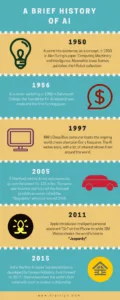Artificial Intelligence. Two words. These two words have changed how we perceive and create technology, and have also possibly changed the course of the future of humanity.


Although many developments in AI known to the common person started happening only in recent years, it came into existence, as a concept, in 1950 in Alan Turing’s paper ‘Computing Machinery and Intelligence.” A summer workshop then followed this in 1956 in Dartmouth College, where the foundation for AI research was made, and the first funding is given.
It hasn’t exactly been a smooth road for AI since then. Funding was stopped, given back, and then stopped again for several reasons, a significant one being the lack of powerful enough computer hardware to turn the idea into reality. However, at the beginning of the 21st century, investment and interest in AI shot up again with the advent of machine learning in academia and industry. The necessary powerful computer hardware was then available.
Fast-forward to 2017. We’re in a world of advancements that are progressing at such a high rate that it is predicted that we wouldn’t be able to recognize our own world by 2050. Experts in the field of artificial intelligence predict reaching a state of technological excess called “singularity,” which might enable AI to just take the baton from humans in the race for colonizing the universe.
Today, we are surrounded by AI in so many forms all around us. From Siri to Sophia, we have seen AI become more and more prevalent each day. We are all now so used to using our phones for pretty much everything to do with our lives to the extent that phones quickly eliminate the need for conventionally used items for, say, news reading or note-taking. Needless to say, AI is only enabling our dependency on our phones even further by becoming easier than ever to use. Just talk to the phone, and you have your message sent. One command can get your favorite track playing. You can even instruct your phone to read out news topics according to your preferences, your location, or even your current internet activity.
And this is how, ladies and gentlemen, the slow takeover of AI is coming to be, and it’s just the beginning!
Note: The very little knowledge that I currently possess deems me unqualified to even attempt delving into the depths of this topic. But, I am reading and gaining more knowledge even as you’re reading this, and I hope to understand better the infinite opportunities and scenarios offered up by Artificial Intelligence. Until then, I will leave you with this layman’s perspective of what could very well be the best invention humankind would have to offer to this world.



One Comment